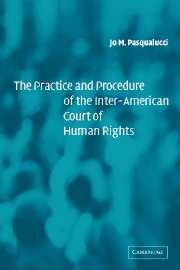Book contents
- Frontmatter
- Contents
- Foreword
- Preface
- Acknowledgments
- Table of cases
- Table of Articles of the American Convention on Human Rights
- Table of 2001 Rules of Procedure of the Inter-American Court on Human Rights
- Table of 2001 Rules of Procedure of the Inter-American Commission on Human Rights
- Table of other legal instruments and documents
- 1 Introduction
- PART I The advisory jurisdiction of the Inter-American Court
- PART II The contentious jurisdiction of the Inter-American Court of Human Rights
- 3 Preliminary objections: legitimate issues and illegitimate tactics
- 4 Proceedings on the merits: fact-finding and attribution of State responsibility
- 5 Victim reparations
- PART III Provisional measures
- Appendix 1 American Convention on Human Rights
- Appendix 2 Rules of Procedure of the Inter-American Court of Human Rights
- Appendix 3 Statute of the Inter-American Court of Human Rights
- Appendix 4 Rules of Procedure of the Inter-American Commission on Human Rights
- Appendix 5 Form for presenting petitions on human rights violations
- Bibliography
- Index
3 - Preliminary objections: legitimate issues and illegitimate tactics
Published online by Cambridge University Press: 28 July 2009
- Frontmatter
- Contents
- Foreword
- Preface
- Acknowledgments
- Table of cases
- Table of Articles of the American Convention on Human Rights
- Table of 2001 Rules of Procedure of the Inter-American Court on Human Rights
- Table of 2001 Rules of Procedure of the Inter-American Commission on Human Rights
- Table of other legal instruments and documents
- 1 Introduction
- PART I The advisory jurisdiction of the Inter-American Court
- PART II The contentious jurisdiction of the Inter-American Court of Human Rights
- 3 Preliminary objections: legitimate issues and illegitimate tactics
- 4 Proceedings on the merits: fact-finding and attribution of State responsibility
- 5 Victim reparations
- PART III Provisional measures
- Appendix 1 American Convention on Human Rights
- Appendix 2 Rules of Procedure of the Inter-American Court of Human Rights
- Appendix 3 Statute of the Inter-American Court of Human Rights
- Appendix 4 Rules of Procedure of the Inter-American Commission on Human Rights
- Appendix 5 Form for presenting petitions on human rights violations
- Bibliography
- Index
Summary
[A State] has the right to resort to every legitimate judicial remedy and procedure to defend itself against charges that it has violated the treaty. What it may not do is interpose manifestly ill-founded and trivial motions whose sole purpose can only be to disrupt and delay the orderly and timely completion of the proceedings.
Preliminary objections: an overview
A preliminary objection is an objection to a tribunal's consideration of a case. When a party submits a case to a tribunal, the respondent may make legal objections to the Court's authority to act. The respondent may object that the case was initially inadmissible, that the enforcement organs did not have jurisdiction, or that the enforcement organs did not follow all the procedural or technical requirements of the treaty. As articulated by the International Court of Justice, ‘the object of a preliminary objection is to avoid not merely a decision on, but even any discussion of the merits’. Before an international tribunal can consider whether the State has violated substantive provisions it must first rule on any preliminary objections. If certain of these objections are admitted by the Court, it may result in the dismissal of an otherwise factually verifiable case. Rosenne lamented the English use of the term ‘preliminary objection’ rather than ‘preliminary question’ because he believed that it resulted in unnecessary difficulties:
It is to be regretted that the English language has to use the word ‘objection’ and not ‘question’; it incorporates misleading overtones absent from the corresponding French term exception, redolent of the exceptiones of Roman law. […]
- Type
- Chapter
- Information
- Publisher: Cambridge University PressPrint publication year: 2003
- 1
- Cited by



